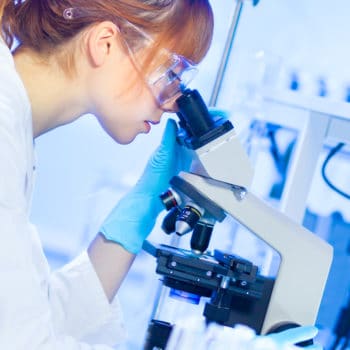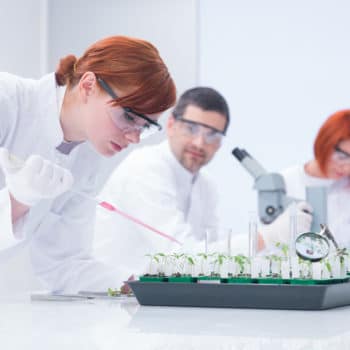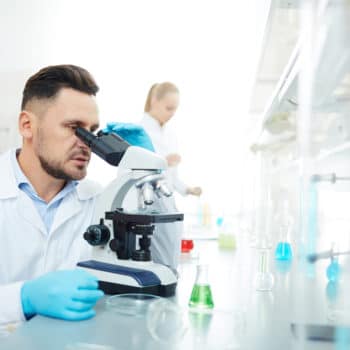Why We Love It
-
$45,230Potential Avg. Salary*
-
Growing DemandJob Outlook
* Salary & growth data is based on the recent Bureau of Labor and Statistics data published at https://www.bls.gov/oes/current/oes194021.htm for 19-4021 Biological technicians 11/2021. Based on national data, not school-specific information. Conditions in your area may vary.
With a bachelor’s degree in biotechnology, you’ll gain the knowledge and skills needed for a career developing technologies used in all fields of the biological sciences, including agriculture and human and animal healthcare.
Biological technicians use a combined understanding of the fields of biology, engineering, and technology to develop innovative technological advances that encourage, sustain, and extend life.
What is a Degree in Biotechnology?
Are you looking for a career where you use your knowledge of biology and technology to develop new seeds that are resistant to disease, new devices that provide medical treatments and procedures, or new pharmaceuticals that help save and extend life?
If so, a degree in biotechnology may be right for you. Biotechnologists are at the forefront of innovation in the life sciences fields, and they use their knowledge, skills, and creativity to develop technological advances and work to promote life and health.
In a biotechnology program, you’ll engage in an interdisciplinary study of the fields of biology, chemistry, information technology, and engineering.
You’ll learn about bio instrumentation, techniques in the biosciences, and microbiology. Graduates of biotechnology programs can pursue a variety of careers. Some continue on to graduate school to become physicians, engineers, surgeons, and geneticists, while others find work as assistants in government, university, and private biotechnology research and development firms.
Recommended Schools
What Courses Would I Take For a Major in Biotechnology?
- Molecular and Cellular Biology
- Bioinformatics
- Analytical Chemistry
- Human Anatomy and Physiology
- Pathophysiology
- Pharmacology
- Biomaterials
- Biotechnology and Pharmaceutical Processing
What Jobs Can You Get with a Degree in Biotechnology?
Demand for biological technicians is expected to grow at the same rate as the national average for other jobs, so there should be opportunities in the field for graduates of biotechnology programs to work in agricultural and healthcare researcher, assistant, and technologist positions.
The highest demand is expected to be within certain specialization of the discipline, including roles in the genetic engineering of crops, the pharmaceutical and healthcare research industry, and in environmental sustainability roles.
How Long does it take?
A bachelors in Biotechnology will have a typical length of 4 years in a full time schedule. That said, there are many ways to speed up the timeframe by either taking more units via online coursework, community college, or taking free classes at OnlineDegree.com that could transfer to universities in the US.
Online Biotechnology Degree
Biotechnology is an applied science that combines theoretical scientific knowledge and practical laboratory skills. Accordingly, a proper choice to study biotechnology online is the hybrid learning mode.
Theoretical courses can then be studied online while practical laboratory skills can be learned practically on campus. Almost all biotechnology degree programs require completing an internship and graduation project to earn the bachelor degree.
What Can You Do With a Biotechnology Degree?
Biotechnology is a branch of biology that is focused on the use of biological systems for industrial purposes. The science overlaps with various applied sciences as medicine, pharmacy, agriculture and food science. The value of the biotechnology industry in the US was estimated to be around $700 billion in 2018.
The value is still increasing with the discovery of more powerful and useful tools that provide solutions for challenging problems. For example, biotechnology was used since 1978 to produce human insulin from bacterial cells which was the first product of biotechnology. This insulin can be used more safely without causing allergic reactions compared to animal insulin that was used previously.
Biotechnology was also used to develop other products as crops that can resist infections, and water salinity or provide larger yields. Similar technologies have recently been used to develop medical therapeutics for diseases that have no satisfactory treatments.
What does a biotechnology student learn?
Biotechnology students need to understand the fundamentals of biotechnology which include studying biology, biochemistry, genomics and proteomics. Biotechnology students also need to learn about the intended applications including medicine, agriculture and food technology.
The following list shows the courses commonly offered in degree programs:
- Organic chemistry: this science focuses on the chemical structure, properties and reactions of organic materials as proteins, carbohydrates, nucleic acids or other biological materials. This is an essential course for biotechnology students as it helps them understand the tools and products of this industry.
- Cells and molecular biology: this course introduces the structure and functioning of the cell which is the building block of all living organisms. The course also introduces the molecular basis for cellular processes which involves signaling molecules, enzymes, nucleic acids and proteins.
- Plant and animal tissues: this course presents a higher overview of living organisms by considering their tissues. Regeneration of tissues is one of the major objectives of biotechnology which can provide solutions for health conditions that still have no treatment.
- Biochemistry: it is the study of the chemical processes in biological systems with a focus on the functions of these chemicals.
- Genomics: it is the study of the structure, function, mapping and editing of genes. This is the main tool currently used in biotechnology. For example, human insulin was produced by gene editing of bacterial strains to introduce the genes responsible for insulin production.
Now I have the biotechnology degree…where can I work after graduating?
Studying biotechnology prepares you to work in innovative and leading companies in a large number of industries as the food industry, pharmaceuticals and agriculture. The following list shows a number of career options available for graduates:
- Biomedical engineer: the role of this job is to use engineering and biological knowledge to develop innovative and efficient medical products such as artificial organs and prostheses.
- Biochemists: study the chemical properties of biological molecules. This job is needed in a variety of fields including pharmaceutical companies and diagnostic labs.
- Lab technician: biotechnology graduates master the lab skills of cell culture, tissue culture, biochemical and genomics labs.
- Process development scientist: the role of this job is to develop the production process and the scale-up of products that have already been established as useful and safe.
- Governmental or environmental authorities: the use of gene-modified products is still a concern for countries and people around the world due to uncertainties regarding the health effects of such products.
Should I choose a biotechnology degree?
Biotechnology is a scientific discipline with a wide variety of applications and much space for innovation and creativity. If you have a passion for science and want to develop products that can have a significant impact on people’s lives, then you should consider it. It is an advanced field of study though that requires having a number of skills for success:
- Lab skills: almost all of the work related to biotechnology requires work in labs with strict safety precautions. Additionally, biotechnology experiments are highly sophisticated requiring highly advanced skills to achieve its accuracy and reproducibility.
- Data analysis: biotechnology depends on huge data obtained from living organisms including millions of nucleic acids, proteins and other molecules. Biotechnology scientists use data analysis programs to dig into this data and reach valid conclusions and results.
- Attention to detail: a change in only one among millions of molecules can make a significant overall change affecting the whole organism.
- Written communication skills: you should be able to communicate your observations and results using accurate, clear and concise language. You may frequently need to communicate with people in the industry.
- Research: you should always be up-to-date and aware of the recent changes or new tools introduced to the field.
- Problem-solving and troubleshooting
Recommended Schools
Best Jobs for Biotechnology Degrees
Biotechnology program graduates find work in the agriculture, healthcare, and engineering industries, working as biotechnologists in research and development roles.
With a bachelor’s degree, you may qualify for technician and research assistant roles, and with additional graduate education, you may be able to work in higher-level positions like phytopathologist, cytotechnologist, biochemist, or pharmacologist.
How to save time and money
Our mission is to help you to avoid paying full price for college. We want your Biotechnology degree to be affordable and accessible. Here’s how you could save:
Create Your Free SmartPlan

There are many ways to make college affordable and accessible.
That’s why we created a helpful tool called SmartPlan.
It’s free, and helps you find potential ways to save and tons of information about each school you’re considering
Think of it as your “college blueprint”, to help you instantly craft a path to your degree:
- Which Colleges Match Your Needs
- Ways You Could Save Time & Money
- Free Courses You Could Take for Credit
- Valuable Data and Insights on Each College
- Detailed Steps You Should Take!
See what’s possible for you and generate a free plan within just a few minutes
Create My SmartPlanYou Might also be Interested in
Many visitors who look for a degree in Biotechnology are also interested in the following degrees.













